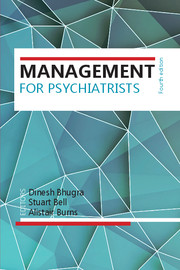Book contents
- Frontmatter
- Contents
- List of contributors
- List of figures, tables and boxes
- Preface
- Part I Theoretical overview
- 1 History and structure of the National Health Service
- 2 The politics, funding and resources of the NHS in England
- 3 Medical management
- 4 Doctors and managers
- 5 Resources in the NHS
- 6 The development of community care policies in England
- 7 Psychiatry management and legislation in Northern Ireland
- 8 Mental health services in Scotland
- 9 Mental health services in Wales: policy, legislation and governance
- 10 The Mental Capacity Act–an update
- Part II Changes and conflicts
- Part III Personal development
- Index
4 - Doctors and managers
from Part I - Theoretical overview
Published online by Cambridge University Press: 02 January 2018
- Frontmatter
- Contents
- List of contributors
- List of figures, tables and boxes
- Preface
- Part I Theoretical overview
- 1 History and structure of the National Health Service
- 2 The politics, funding and resources of the NHS in England
- 3 Medical management
- 4 Doctors and managers
- 5 Resources in the NHS
- 6 The development of community care policies in England
- 7 Psychiatry management and legislation in Northern Ireland
- 8 Mental health services in Scotland
- 9 Mental health services in Wales: policy, legislation and governance
- 10 The Mental Capacity Act–an update
- Part II Changes and conflicts
- Part III Personal development
- Index
Summary
The historical background
The Association of Medical Officers of Asylums and Hospitals for the Insane met for the first time in 1841 at the instigation of Dr Samuel Hitch, resident physician of the Gloucestershire General Lunatic Asylum. It was a gathering of the medical men in charge of asylums across the UK. The Association met with increasing regularity, until in 1865 it changed its name to the Medico-Psychological Association. That was an important step in the organisation's development from arranging gatherings at which members aimed ‘to cooperate in collecting statistical information relating to insanity and above all … assist each other in improving the treatment of the insane’ and towards becoming a professional body for doctors with an interest in the study of insanity (Bewley, 2008). In 1926, following the grant of a Royal Charter, it became the Royal Medico-Psychological Association, and in 1971 it became the Royal College of Psychiatrists. Over the course of 130 years it evolved from being a body brought into being by those who were in effect the managers of the mental health services of the country to being a professional Royal College for specialist doctors.
That pattern of evolution is part of a more general trend described by the social historian Harold Perkin in his 1989 book The Rise of Professional Society. He describes the change which took place in England between the 1880s and the 1980s and which established professions as a dominant form of social structure, especially in the workplace. In 1880, he notes, ‘there were still only twenty-seven qualifying associations … (counting the four Inns of Court for barristers and the two Royal Colleges and the Society of Apothecaries for medical doctors), but thereafter there was enormous expansion’. By 1970 another 140 had been added, plus an even larger body of non-qualifying but professionally oriented associations. Society, in short, had become professionalised, reflecting both the growing specialisation of skills following the Industrial Revolution and the growing role of government and its agencies in everyday life. As the roles and numbers of professions grew, so by turn more and more people became correspondingly ‘lay’ with respect to an increasing number of areas of expertise.
- Type
- Chapter
- Information
- Management for Psychiatrists , pp. 52 - 64Publisher: Royal College of PsychiatristsPrint publication year: 2016



